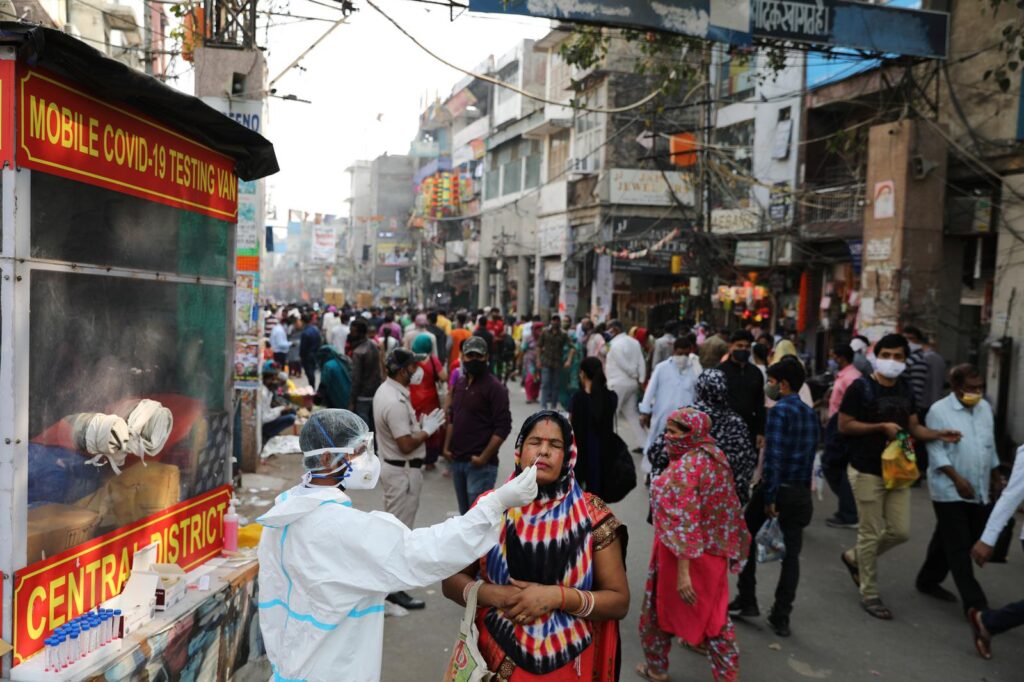Here’s Why India’s Coronavirus Cases Have Fallen Sharply
Feb 6, 2021 | Pratirodh Bureau
FILE PHOTO: A healthcare worker collects a swab sample from a woman amidst the spread of the coronavirus disease at a market in the old quarters of Delhi on November 13, 2020
With its 1.3 billion population, India has the world’s second-highest number of coronavirus infections — more than 10.8 million — but new cases and deaths have fallen sharply in recent weeks.
This week, new daily infections were the lowest in eight months, while deaths fell below 100 — the smallest single-day total since May.
Here’s a look at how the South Asian giant has tackled the pandemic:
What are the official figures?
India reported its first Covid-19 infection on January 30, 2020 and its first death in mid-March.
The number of new daily cases peaked at just over 97,000 infections in September, with deaths averaging 1,000 a day that month.
Deaths then started to decline. On Tuesday, just 94 fatalities were reported, out of 8,635 fresh infections.
India has one of the lowest case-fatality ratios among the top 20 worst-affected nations in the world.
How many have really been infected?
Experts say the number of people in India who have contracted the disease is probably much higher than the official figure. They are backed by various state and national surveys measuring antibodies for the virus.
An official national survey in December-January of urban and rural neighbourhoods as well as healthcare workers suggested that some 21.5 percent — almost 280 million people — carried antibodies.
In the capital New Delhi, one of India’s worst-hit cities, serological data released this week found that more than half of the 28,000 people sampled had developed antibodies.
How has the pandemic been handled?
Experts had warned that the coronavirus would wreak havoc in India’s densely populated cities, which are plagued by poor sanitation. There were also fears the chronically underfunded healthcare system would not be able to cope.
The government sought to clamp down early, halting international flights and imposing one of the world’s strictest lockdowns in March. Masks were made compulsory in many states.
Restrictions have been gradually eased since June as the government sought to boost the pandemic-devastated economy.
The population has become more relaxed. Hundreds of thousands flocked to the Kumbh Mela Hindu festival in January, mostly without masks.
And tens of thousands of farmers have been taking part in crowded protests in Delhi since November to fight new agriculture laws.
Doctors in Gujarat, Uttar Pradesh and Andhra Pradesh states, as well as in major cities Delhi and Mumbai — with a combined population of more than 330 million — told AFP they have seen a significant decline in cases at their hospitals.
In Delhi, the government said 90 percent of dedicated Covid-19 beds were unoccupied.
“Earlier there used to be a huge waiting list. Now hardly 40-50 patients are here,” said Deven Juneja, a doctor AFP met at the Max Smart Super Speciality Hospital in June.
“We are now slowly limping back to normalcy in terms of offering our services in departments, which until now, were virtually paralysed due to the pressure of Covid-19 cases,” said Sudhir Singh, spokesman at King George’s Medical University in Lucknow, Uttar Pradesh.
‘Herd immunity’?
Experts said that without conclusive data, it was impossible to say why India’s figures had fallen so dramatically.
There are mixed views on whether herd immunity — when a significant proportion of a population is immune to an infectious disease — may be present in much of India.
“My understanding is that there are enough people in India who have been exposed to the virus. And that’s possibly why the numbers are going down,” virologist Shahid Jameel told AFP.
“But in the absence of real numbers, it’s really hard to say.”
The World Health Organization’s regional director, Poonam Khetrapal Singh, praised the country’s mask wearing, distancing and hygiene, saying they had proved effective in curtailing transmission.
But she added: “India is a vast and diverse country and it’s hard to attribute the decline in cases to herd immunity.”
Meanwhile, India has rapidly rolled out vaccinations with the ambitious goal of inoculating 300 million people by July.
Risk of resurgence?
A study published in The Lancet last week noted that in the hard-hit city of Manaus, Brazil, there had been a resurgence of Covid-19 – despite a high prevalence of people with antibodies.
Some of the reasons offered include waning immunity from prior infections, and a new, stronger variant.
Experts say such developments mean it is too soon for India to celebrate.
“We cannot let our guard down,” Singh said.
“The longer we let the virus transmit anywhere, the higher the risk of variants. This risk is real, globally.”
